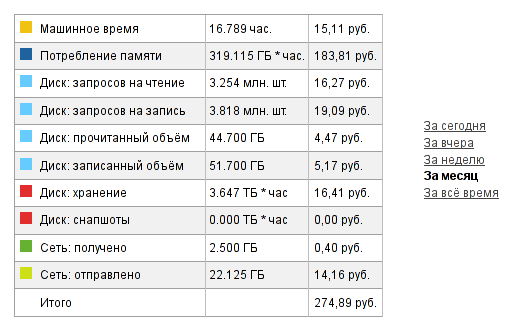“Nefigigism” - the experience of creating a non-commercial project (three years of exposure)

A few weeks ago, the “Nefigigism” project turned three years old, which, in my opinion, is a rather serious “age”. A non-profit project that works solely on bare enthusiasm and is not financially supported either by investors or like-minded people is relatively difficult to live for more than one year, so it’s safe to say at least the only fact: the project is definitely in demand.
This publication is not only and not so much an attempt to public relations (for the sake of purity of the experiment, all previous publications of two years and more ago were transferred to drafts), as an attempt to share with Habr participants experience in developing and supporting a non-commercial project, to publish typical and atypical errors, to tell how we coped with them and did not cope.
')
Due to the fact that the size of the text exceeds reasonable limits, the publication will be divided into at least two parts: in the first part I will talk about how the project was created, how it evolved, how it was finalized; in the second part, if my karma does not fall to negative values, I will talk about mistakes, breaks, failures, flaws, bouts of powerlessness and how we heroically overcame something, but something overcame us, and I will try to answer centrally on criticism and questions that are available in the comments for the first publication.
In addition, due to the fact that many habraujers have a very negative attitude towards publications in the respective hubs, all active hyperlinks will be placed in the final part of the article and their number will not exceed reasonable limits.
So, let's begin?
About the project: general information
“Nefigigism” is a community of very different people who provide each other with legal assistance, share experience and try to prove in practice that everyone can protect their rights, and the laws can work as they should.
At the heart of Nephigism are several principles that are united by a simple idea: “if someone can do something well and if someone sometimes has time to do it for free, then why not combine these people?”.
In our case, we are talking about legal assistance, which is inaccessible in our wonderful country, which is explained by the senseless and ruthless price-quality ratio: the cost of legal services varies from “expensive” to “extremely expensive”, while the quality remains uncertain.
Unlike “free legal advice,” project participants do not require visitors to pay for the full version of the answer: no reciprocal commercial obligations bind neither those who advise nor those who are advised.
In practice, it turns out something like the following: a visitor asks a question - the visitor gets an answer - the visitor gets practical experience in solving a problem and some basic minimum of theoretical knowledge; what to do next is only his choice.
In most cases, the visitor, having received an answer to an interesting question, simply leaves - until the next time or forever. This happens often.
In a minority of cases, our idea works - the visitor understands that protecting his rights is not so difficult, moreover, he now has experience and knowledge that can be passed on to someone else, and, as a rule, this happens on the project website.
Now, when someone comes to the site and asks a similar or similar question, not only professional lawyers answer it, but also those who have already been able to solve something similar on their own or with our help.
Such is the kind of relay of legal knowledge without mutual obligations.
Project Development: Technical Details
If you have previously read something similar on the project site or in old posts on Habré, you can safely skip this part of the publication, but if not, I suppose that this information will clearly not be superfluous.
So, at first it was a regular single-user blog running Wordpress. Formally, it is from this moment that the project creation time is being counted, in fact, probably, this is not quite so - at that time the whole project was just my cozy blog, in which posts of universal human content were not too often interspersed with posts of legal content.
Formally, Wordpress was not so bad: a serious community, open source code and a large number of various add-ons at first glance were decisive advantages, but all of them easily overlapped with just two drawbacks - hellish leisurelyness and remarkable voracity.
At that time, the project was hosted by SpaceWeb (I was not confident in my abilities and therefore I chose the cheapest suitable tariff, observing the rule “it is better to be cheap and angry than expensive and good”).
The approach justified itself: hitting the head with a rake was not in vain. The move was made to a higher-quality tariff, at the same time I changed the CMS to the one that more met my requirements: also “open source”, ease of setup and a larger number of purely social “features” (ratings, karma, mailings - in general, “your own Habr, with poker and virgins ").
At that moment, I liked CMS Cogear the most, and it was on this CMS that the project “Non-Faggism” worked for most of its life.
I can’t say anything bad about Cogear, but I can only say good things: at that moment I was more than satisfied with the functionality of the system, I was amazed at the economical attitude to RAM, and I was struck by the resilience to attendance spikes.
Everything was pleasing, even Scalaxi at that time seemed not a bad option, but Cogear stopped me - the community began to actively develop the second version, the first version of the CMS actually stopped being supported, and at that time I needed more advanced social features. which only LiveStreet could offer me.
In the course of practical operation, LiveStreet proved to be very, very good: relatively quickly, I got used to the logic of the system, I was able without any problems to learn to correct the code and refine the template to fit my needs.
Particularly pleased with a serious number of plug-ins: if necessary, the functionality of the site expanded almost simultaneously with user requests, which had a positive effect on the reputation of the project.
By the way, as a result of all the perturbations, the site works on Debian 6 + nginx + php-fpm. The gain in comparison with Ubuntu + Apache is significant.
Judge for yourself on the LoadImpact test results (the first graph is Debian / nginx / php-fpm / php-apc / memcache / LiveStreet, the second graph is Ubuntu / Apache + mod_php / MySQL / eaccelerator / memcache / Cogear). In both cases, caching was enabled, hosting (at that time) - Scalaxi.

By the way, here is the actual testing data; It seems that everything is not working so badly?
Now the project site feels great on a cloud machine in Selectk, as a result of the escape, hosting costs have more than doubled without any negative effects.

A similar configuration in Skalaksi cost me about 700 rubles. Not bad, moving happy.
Project Development: Non-Technical Details
As practice has shown, when developing a community, an important point is not only the content, but also the form. It is difficult to say what exactly is primary (the dispute will turn out from the category “what was first, the chicken or the egg”), but each time as the site developed, it was necessary to change very, very much beyond recognition, a lot of things, causing a significant amount of hatred .
When the site was a simple single-user blog, there was no particular problem at first: I wrote about a current legal article, comments appeared, I answered them and everyone was happy.
Problems began when attendance began to exceed a hundred people a day. Too many questions and too many answers led to the fact that visitors had problems finding the right content. Again, because of its limitations, Wordpress is in principle not a tool for creating a community.
The exit lay on the surface: it was necessary to build a small social network.
Again, at first, everything was wonderful: theoretical articles were combined on the basis of uniformity into relevant collective blogs. At the same time, the majority was given a collective blog with the saying title “Help is needed!”, Which temporarily solved all the problems.
At that time, we were faced with the fact that the content of the site degraded to the state of “free legal assistance to download online without SMS registration for free”: there was no longer any mutual assistance, people came in, asked a question, received an answer from active members of the site ( the moment - from the power of man three, who, by the sweat of their brow, tried to do something) and with a clear conscience left.
I was ready to give up, but suddenly something happened and the project started working as planned - somehow a qualitative leap occurred unexpectedly, and now the active audience of the site increased about ten times, the system of mutual aid started to work, and typical questions the answers to which were already given eleven times, disappeared somewhere, giving way to really serious problems.
As a result, we came to the conclusion that there is now: the total number of users exceeded two thousand people, about a hundred of them are active participants who find time to participate in discussions, constructive assistance and exchange of experience.
Attendance is gradually increasing, the quality of consultations does not seem to be falling, and recently the transition from the “question and answer bureau” to the community, whose priority goal is the exchange of practical experience, has taken leaps and bounds.
It seems all is well. In practice, this is not entirely true, and about this (if karma does not fall below the minimum 20 units) I will write the following article.
The only link to the site
PS If you have information about typos, please write to private messages. Thank.
Source: https://habr.com/ru/post/147123/
All Articles